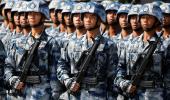'The Chinese media was beside itself with rage that how can a country with one-fifth of its economic power and maybe one-third of its military power stand up to them and not allow them to wean away a small Himalayan kingdom.'

Nitin A Gokhale -- author of the new book Securing India The Modi Way - Pathankot, Surgical Strikes and More and founder of Bharatshakti.in -- speaks to Rediff.com's Utkarsh Mishra about China, the Maoist menace and the Rohingya issue in the concluding part of the interview.
You write about possible political reasons behind the standoffs in Chumar and Doklam.
Although, as you said, it is too soon to offer an analysis, why was the Chinese State media unusually aggressive this time?
Was it because the Chinese did not expect India standing up for Bhutan?
They did expect some diplomatic protests from Bhutan, but what they definitely did not expect was military intervention from India, in what they consider their own territory.
They never thought India would do this. But India had to do it for strategic purposes.
Therefore, I think, the Chinese media was beside itself with rage and anger that how can a country with one-fifth of its economic power and maybe one-third of its military power stand up to them and not allow them to wean away a small Himalayan kingdom.
That was the anger all about.
Indigenisation of defence technology is another area the government is focussing on strongly, you say. But do you think quality is a major constraint when it comes to India-made defence equipment?
There are two issues in this. Of course, quality has to be maintained by Indian companies and the armed forces are well within their rights to reject any substandard equipment when it comes to that.
However, Make In India is not all about arming the forces only with indigenous defence equipment.
It is about creating an ecosystem which will be self-sustaining, so that when push comes to shove, India should be able to manage its own resources like ammunition, spare parts and all the other stuff.
There is no doubt that quality is a concern and it has to be improved by the Indian companies. Overall, I think the intention is correct.
Although, I am slightly disappointed with the implementation of the programme and a rather erratic handling of the defence portfolio.
It could be implemented faster, but there we are. To change something which is very opaque in the defence ministry takes a lot of time.
But I'm not totally pessimistic about it. I'm sure things will improve. And lots of policy changes are coming.
Would Manohar Parrikar staying back in the defence ministry helped more?
(Laughs) Yes, it's my personal view. It was like someone batting for 20 overs and scoring a 100 runs in a 50-over match and poised for a bigger score, suddenly gets run out or retires voluntarily.
But that's what it is. And in an institution no individual is indispensable. Now that we've a full-time defence minister there's hope again, let's see.
You also gave details of the government's contract with foreign vendors of defence equipment increasing massively in number and in value over the years.
Does it adversely affect the Make In India push or the indigenisation drive?
No, it will not. Make In India can still succeed. All equipment which are being imported are the essentials which cannot be ignored.
Also, one thing must be understood that in defence, you cannot suddenly reduce imports. Even if, over the next five years, imports are reduced by 10 per cent every year then it's a reasonable target to achieve.
Some of the equipment will have to be purchased from outside, there's no alternative to that.
Given the efforts of the Centre to, in the words of PM Modi, 'promote jointness across every level of the armed forces' and appointment of a chief of defence staff, one wonders if the appointing a CDS would render the roles of the three service chiefs redundant?
Not at all. The chiefs will remain operational heads as they are.
The role of a five-star or four-star chief of defence staff will be, one to coordinate and pool resources; two to look at some of the tri-service organisations and agencies which are already existing and which are likely to come in space and cyber and special forces.
However, if you want to build a 20-storey structure, you can't start with building the 20th floor first. The incremental approach has to be followed.
We've been talking about a CDS for 16 years now. There has been some progress.
More could've been done, but I'm not totally disappointed with the pace.
Quoting NSA Doval, you write at one place that the PM strongly believes that 'We should not do or support anything that is not in consonance with India's core values, or that might be internationally unacceptable'.
In the light of this statement, do you think the government's stand on the Rohingya issue is justified as it clearly runs counter to India's core civilisational values that have harboured and sheltered the persecuted and fleeing?
I think the issue is being handled properly. We've to keep our national interests as well as international relations in mind.
We're friendly with both Myanmar and Bangladesh. It's a fine balancing act that India is following. We cannot antagonise one of them completely.
And let's not minimise the possibility of radicalised Rohingyas posing a national security threat.
Nobody is saying that all refugees are a threat, but elements within those refugees can be a threat.
Again, as I said. these diplomacy issues are never black and white. So India is handling it very well.
It has to keep in mind relations with both countries before taking decisions either way.
It is completely in consonance with India's core values.
In any case, India is not a signatory to the refugee convention. So we are not doing anything against the law.
The government has the right to screen the refugees and see to it that they don't become a menace.
By being soft earlier, we're already paying the price in the north east.
Writing about the Maoist menace, you say that a lack of political consensus impedes the reforms necessary to tackle the problem.
Now that most of the Naxal-affected states are ruled by the National Democratic Alliance, do you think this objective can be achieved?
I think there is much better common understanding between the states and between the states and the Centre on the issue.
One because, as you said, most of the Maoist-affected states are now under NDA rule.
And secondly, again it is because of the willingness to stick to the hard route of not getting affected by periodic ups and downs.
Once the PM takes a decision, he sticks to it, even after one or two setbacks like a Maoist attack or raid.
Earlier (in the aftermath of a Naxal attack) there would be immediate calls from within the government to (talk to them). That (difference within the government) has thankfully vanished. There is one single purpose, which is fine.
And there have been reports that Maoist violence is reduced. They're not completely out, but they are certainly down.
Photograph: Thomas Peter/Reuters











 © 2025
© 2025